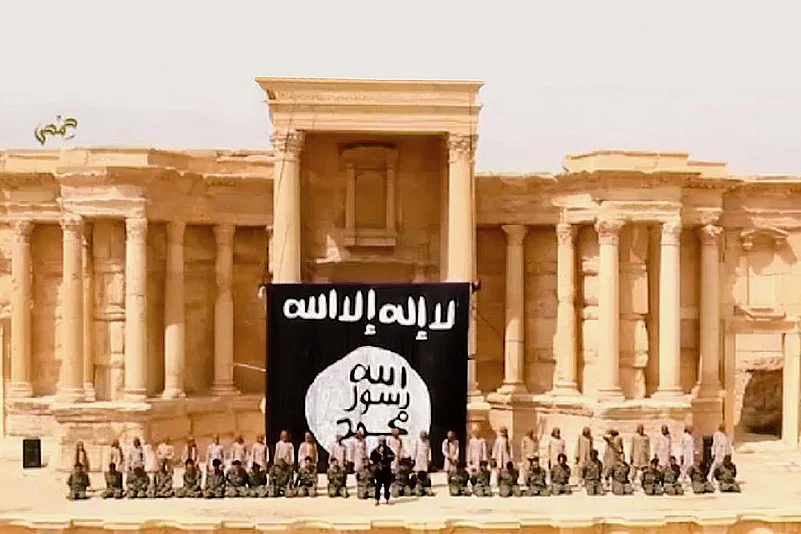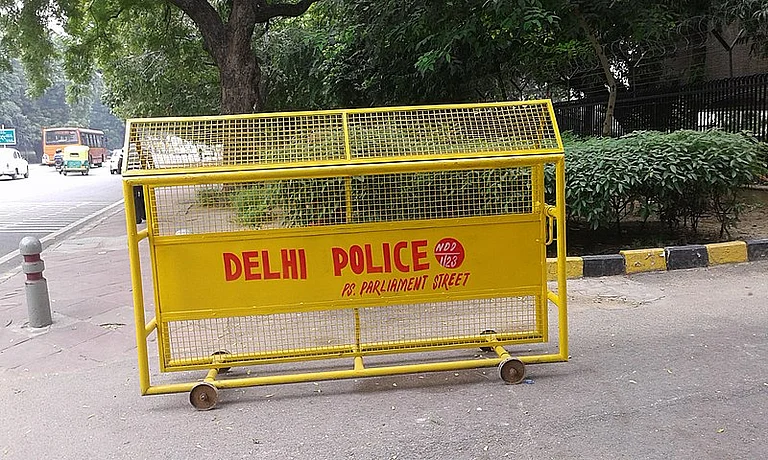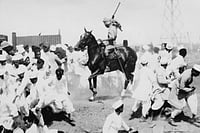The terror attacks in Paris and the apparent bombing of the Russian charter flight over the Egyptian Sinai have once again exposed the confusion of the Arabs and Muslims when it comes to the Islamic State (ISIS) and the Syrian crisis. Although ISIS has killed more Muslims than Christians, Jews and others over the past few years, most Arab and Islamic countries still have their heads buried in the sand and continue to pretend that the radical Islamists are a problem of the West alone. Sadly, modern history has shown how all too often they look to the West to resolve their internal crises. Today, the only Arabs and Muslims actively engaged in the war on Islamic State and its affiliates are Syrian dictator Bashar Assad, Egypt’s Abdel Fattah al-Sisi, the Iraqi government, Iran, and its Lebanese proxy, Hezbollah.
Another exception comes in the shape of Syrian and Iraqi Kurds, who recently recaptured Sinjar from ISIS, following similar earlier successes in Kobani and Kirkuk. Of course, it comes with a price tag attached. The Kurds hope their military successes will bring them closer to realising their dream of an independent Kurdistan, incorporating parts of Syria, Iraq, Armenia and, most importantly, Turkey.
An alarmed Turkish government, concerned that these Kurdish successes would fuel the ambitions of its own Kurdish minority, hit back last month at bases of the Kurdish People’s Protection Units, also known as the YPG, when they approached too close to Syria’s border with Turkey. These are the same YPG units that have managed to establish three so-called independent cantons in northern Syria in defiance of ISIS. When the Kurds late last month went on to capture the town of Tel Abyad near the Syria-Turkey border, Turkish president Tayyip Erdogan commented, “If the Kurds withdraw and don’t form a canton, there’s no problem. But if the mindset continues, then what is necessary will be done or we face serious problems.”
Meanwhile, as the Kurds celebrate their military successes, other Muslims and Arabs are simply sitting on the fence and watching as ISIS slaughters dozens of their people on a daily basis. After the Paris attacks, Arab and Muslim leaders were quick to come out with statements condemning the “criminal acts against Islam and human values”. But their top priority still is to guarantee the survival of their regimes at any cost. The only time they are prepared to act is when they feel the fire is getting too close to home. Otherwise, as long as Islamic terrorists are slaughtering Muslims in merely hopeless Syria and just as hopeless Iraq, or just targeting foreign nationals, these leaders see this as a problem exclusive to the US and its western allies.
What’s even more disturbing is that some Arabs and Muslims have over the past few days started pointing an accusing finger at the West, holding it responsible for the emergence of ISIS. “Countries like the US, UK and France produced Islamist terrorism with their own hands,” commented Freih Abu Medien, an ex-Palestinian minister of justice from the Hamas-controlled Gaza Strip. “These countries are responsible because they had allied themselves with the dark ideology that is now being exported to the world in the name of Islam.”
Prominent Palestinian editor Abdel Bari Atwan says that the West’s intervention in Iraq and its blind support for key Arab allies, as well as an obsession with removing Assad from power, have all contributed to the strengthening of ISIS. “What is needed is a comprehensive strategy to find political solutions to all the issues in the Middle East, and not just Syria,” he explains. “What is also needed is a full revision of all western and stupid Arab policies which brought us to this explosive and bloody situation. For over three years now, the West and its Arab followers have been arguing, in a rather Byzantine manner, about who should go first—Assad or ISIS. Meanwhile, Assad has remained in power and ISIS is continuing to grow.”
Some Arab analysts say that what is needed now is for western powers to launch a ground offensive against ISIS in Syria. But at the same time, none of these analysts is prepared to talk in support of sending Arab or Islamic troops to fight the terrorists. “Western leaders are wasting their time,” says Saudi columnist Abdulrahman Al-Rashed. “Meetings in Vienna and Geneva will only see the threat of ISIS grow. The international community needs to understand the importance of moving quickly to remove Assad from power and fight the terror groups in Syria....”
Now the consensus is that the terror attacks in Paris and the Sinai are just the beginning of a new phase of anti-western terrorism. They argue that the West’s failure to handle the crisis in Syria is the main reason behind the decision of ISIS to export its terrorism to Paris and other Western capitals. They also argue that the biggest winner is Assad, who now looks like a comparative angel fighting the devil. The West should have moved years ago to remove Assad from power, they say. “I don’t rule out that soon we will see security and political delegations visiting Damascus to coordinate with the Syrian regime in the fight against ISIS,” says Jordanian political analyst Oraib al-Rantawi.
The absence of a properly defined and effective Western role in the Syrian crisis has, meanwhile, paved the way for the Russians to intervene in the conflict. All the Americans have done, as far as the Arabs are concerned, is set up a few training camps to train members of a mishmash opposition militia called the Free Syrian Army or FSA. By contrast, Russian president Vladimir Putin is now perceived as a “hero” and “saviour” for daring to intervene in a more effective way. But the nature of Putin’s intervention remains unclear. Is this aimed at salvaging Assad’s regime or is it part of Russia’s war on Islamic fundamentalism?
Ironically, Putin’s intervention could end up strengthening ISIS. The Russian claim that they have been fighting only ISIS is simply not true. Until recently, more than 90 per cent of their air strikes were targeted against the more moderate Sunni elements who happen to oppose Assad. Those targets, such as the camps of the FSA and their allies, were almost certainly chosen by the Assad regime.
Helping ISIS in this way isn’t just an accident. What Putin has been trying to demonstrate to the wider international community is the choice of supporting either a discredited Assad regime backed by an emerging coalition of Shia powers headed by Iran or accepting the inevitability of a Sunni-backed ISIS across wide swathes of West Asia. So by eliminating the moderates and empowering ISIS, Putin is forcing US president Barack Obama to accept the need for Assad to play a role in blocking ISIS in any future set up in Syria.
For the past four years, Russia has helped ISIS by facilitating the travel to Syria of its own Chechen Muslims. These Chechens are Sunnis and they have been fighting shoulder to shoulder with fellow ISIS Sunnis against Assad. As for Assad, member of a minority Shia sect, he has been releasing Sunni prisoners from his jails, so that they too can join ISIS and contribute to the image of an evolving Sunni monster.
In this respect, so the argument goes, Assad and Putin had a joint strategy long before the Paris atrocities of strengthening ISIS in the short term, so that the rest of the world was convinced it was a genuine threat to international peace and stability, poised to take power in Syria and other Arab countries, including the oil-rich Gulf and Saudi Arabia.
For their part, the Saudis and Americans redoubled their efforts to back the FSA and other elements of the so-called moderate Syrian opposition. This was the outcome of the recent visit to Riyadh by US secretary of state John Kerry. Hence the FSA expectations of more cash and weapons from the West in the weeks ahead.
Mind you, no one is completely sure about the make-up of FSA. In simple Wild West parlance, they are the good guys versus the baddies. But some would argue that they are only classified as acceptable because they are not as unpleasant as ISIS or Al Qaeda. That’s the argument of the Americans who classify FSA as moderate Sunnis.
For their part, the Russians are neither stupid or blind when it comes to the Arab world. Hence the recent meeting in mid- October between Saudi defence minister Mohammed bin Salman, son of the Saudi king, and Putin. The Saudis haven’t changed their stance, insisting that Assad has no role in the future of Syria. They and other Arab governments do not believe Russian PM Dmitry Medvedev’s recent statement that Moscow’s aim in Syria was not to keep Assad in power, but to defeat ISIS. In parts of Arab social media, Medvedev was until recently referred to as a liar.
Russia’s increased involvement comes at a time when Iran is seeking to spread its influence in the region. In Yemen, the Iranians support the Houthi rebels, while they are also involved in the affairs of Lebanon through Hizbollah. In Gaza, they support Hamas and Islamic Jihad. Neither Hamas nor Islamic Jihad are Shia, but the Iranians are not averse to using agents prepared to do their bidding.
Its hard to foresee where all this will end. But one thing is for sure—this Russian intervention in what amounts to the revival of centuries old Sunni-Shia rivalry will not bring stability to the region. On the contrary, Moscow’s involvement in Syria could end up as another Afghan-style nightmare for the Russians, a political and military misery they had never anticipated. Another concern is that as the war intensifies, it could spill over the border into neighbouring Lebanon and Jordan.
A final consideration for the Russians is that all the Arabs factions currently fighting each other, including rival Sunni and Shia groups, could all one day unite against perceptions of Russian occupiers and Russian imperialism. This is after all the Middle East, a region where alliances can change on a whim when outside powers try to interfere in the internal affairs of the region. That’s what the Americans discovered in Afghanistan and Iraq. Look at Afghanistan. The Americans went there to support the anti-Soviet rebels, they ended up supporting the groups allied to Osama Bin Laden and the rest is history.
***
Where The Key Countries Stand
- USA: Training and assisting Sunni militias to topple Assad regime in Syria. Obama reluctant to send in ground troops. Unable/unwilling to stop Iran from backing Hezbollah, which backs Assad and is fighting ISIS.
- Turkey: The NATO member has friendly ties with Kurds in Iraq but is fighting Kurds in Turkey, Syria. By bombarding Kurds in Syria and imposing an embargo on supplies, Turkey is accused of indirectly helping ISIS.
- Saudi Arabia: Two days after Paris, US announced the sale of smart bombs worth $1.2 billion to Saudi Arabia, which along with Qatar, Turkey lit the fire by pouring in money and resources to prop up anti-Assad rebels
- United Kingdom: Since September 2014, UK combat missions in Iraq claim to have killed hundreds of ISIS fighters. Similar airstrikes on ISIS strongholds in Syria under consideration after the attack on Paris.
- EU: France, Germany are either joining the airstrikes against ISIS or supplying military aid to forces trying to cut down Baghdadi’s influence. Also working with Syrian opposition parties for a political solution.
- Syria: In last four years has lost much of the country to ISIS, other rebel groups. Half of its 23 million population displaced. But Assad refuses to step down. With Russia, Iran backing him, US and allies face a dilemma.
- Russia: Putin wants to arrest Sunni Islamist expansion, wants Assad to continue. Air attacks on ISIS strongholds intensified after terror group claimed responsibility for downing Russian jet.
- Lebanon: Two days before Paris, ISIS suicide bombers killed 44 in Beirut. Shias are backed by Iran, while Sunnis have the ‘Future Movement’, backed by Saudis. Once dominant Christians divided.
- Iran: Wants to prop up Assad to counter Israel (also to ensure Shia ally in region). A rebellious Sunni population close to Iraqi border, and the Taliban and Al Qaeda in north Afghanistan are sources of worry.
- Israel: The turmoil in the region forcing Hezbollah to fight the Arabs. Syria on the defensive, Iran getting mired in an uncertain war. This helps everyone forget about the Palestinian cause.
- Iraq: The Shiite regime will defend Baghdad but not reclaim Fallujah. They are in no hurry to end the war against ISIS since that may bring back the Sunni minority to the political mainstream.
- The Kurds: Syrian or Iraqi, they want to defend their newfound borders, not so much to crush ISIS as in hope that Baghdadi will help in dividing the Arab world and dilute the fight against them.
(Shyam Bhatia is a former West Asia correspondent of The Observer, and author of a forthcoming book, Bylines and Bullets, Stories from the Front Line, to be published by Speaking Tiger.)





















